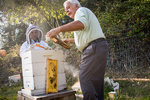
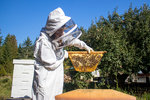
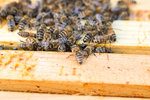
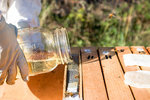
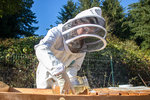
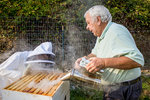
When baby honey bees are born inside the waxen confines of their home hive, they are systematically greeted by a nurse bee who welcomes them to the pollinating party.
After the initial salutations, the fledgling honey bee is then shown around the hive and brought up to speed on the basics of tending the very same brood chambers from which it just recently emerged.
The highly organized structure of a honey bee colony depends on a precise division of labor that is dictated by the needs of the hive along with the experience of the available worker bees. Typically, the jobs are doled out based on physical condition, with honey bees of similar ages winding up in similar positions. For example, a young worker may be given guard duty at the entrance of the hive where they can practice their flights of fancy before graduating to the position of food source forager. While those jobs are often strictly dictated by age, the work inside the brood nursery of the hive is where young and old come together in order to better the hive as aged and infirm bees teach newborns how to take care of business once the elders go to the big flower in the sky.
That sort of mutually beneficial mentorship is no secret to beekeepers, who have been spying on the insulated lives
of bees for thousands of years. Now, with honeybees in peril and the ranks of beekeepers thinning rapidly, those human hive stewards are beginning to replicate the behavior of their subjects with a keen eye toward the future.
The Lewis County Beekeepers’ Association began their youth fellowship program in 2014 with two students based out of Toledo. Like a swarm of honey bees on the move, that upstart LCBA program has moved around each year from township to township searching for new places to carve out a home. In 2015, two students from Onalaska joined the program, and in 2016 the two participants in the program hailed from Napavine and Chehalis. Last year, the program expanded from two openings to three, with two beginning beekeepers located in Centralia and another in Bucoda.
One of those newfound beekeepers from the Hub City is 13-year old Rylea Shan Powell. A homeschool student with a natural penchant for learning, Powell lives with her family in the hills above town.
Since early this spring, Powell’s honeybees have lived there too.
Like the honey bees who learn the ropes of basic bee care from their watchful elders, Powell is working hard to expand her knowledge with the help of longtime beekeeper Gottfried Fritz.
Fritz, who is set to turn 71 on Thursday, has been working with honey bees since he was 15. That’s when his brother married into a beekeeping family, and the rest is history.
Fritz says that there has been more changes to beekeeping over the past five and a half decades than their are wildflowers in a fertile field.
“In the 50s and 60s, beekeeping was not so labor intensive because we did not have the problems with mites and things like that. It used to be that you would just put some bees in a box. Put them in a favorable locations and then come back and harvest the honey later,” said Fritz. “There are actually fewer beekeepers now than there were in the 40s, 50s and 60s.”
With varroa and tracheal mites making a mess of things inside honey bee hives, along with the lingering mystery of colony collapse disorder and ongoing issues with pesticide and herbicide poisoning, the fate of honey bees is far from certain these days.
With the amount of work it takes to keep on top of the myriad problems that honey bees face, Fritz noted that participation in the craft has skewed toward the older, retired set, since they have more time and disposable income to dedicate to their apiary. While Fritz is always happy to have a fellow beekeeper in their ranks, he knows it is imperative to teach the intricate practice of beekeeping to younger generations as well so that honey bees and humans can continue to thrive together.
Powell says she became interested in beekeeping last fall when she heard about the scholarship opportunity through the LCBA. Although she was afraid of honey bees when she first began the program, Powell says she was able to initially overcome that fear with encouragement from her mother. Now that she’s been involved in the program for more than a year and learned all about the pacifist proclivities of her preferred pollinators, Powell says she’s not scared of bees at all. She knows you just have to work them right. Powell credited Fritz, who doesn’t wear a beekeeping suit, mask or gloves when working the hives, with teaching her how to be calm and confident in the face of 60,000 stinging insects.
“I like watching how they work as a team,” said Powell. “I like spotting for the queen, even though I can’t always find her. That’s my favorite part.”
In order to participate in the LCBA youth fellowship program, students must submit an application and an essay detailing why they are interested in keeping honey bees. Once a youth is selected, they are given startup gear, including hive boxes, honey bees and a protective suit. Participants are expected to attend LCBA meetings, complete an 18-hour introduction to beekeeping workshop over the course of several weekends, volunteer at the spring and summer fairs in Lewis County and work continuously with their mentors in order to keep their bees healthy. If the honey bees are still alive and well after the completion of all the coursework one year later, the equipment and hive is officially donated to the student by the LCBA in order to jumpstart the new beekeeper’s apiary operation.
“What’s happening is that beekeeping is becoming a lot older, and a lot grayer,” explained Susanne Weil, secretary of the LCBA. “The program is something that the Lewis County Beekeepers came up with on our own, although other associations around the country certainly do similar things.”
That LCBA’s effort to propagate new beekeepers has even drawn praise from the Washington State Beekeepers’ Association, which tabbed the program as a good example for other beekeeping associations to follow.
“We had enough success with our fundraising that we were able to offer three scholarships last year and we’re hoping to be able to offer three again next year,” added Weil, who noted that the beekeeping program is open to local students in grades 6-10.
“We’re looking for kids who really want to get involved with this,” said Weil. “Honey bees are vital to our food supply and without our pollinators we’re going to be challenged to maintain the type of diverse nutrition that we have come to enjoy, and in order to keep up somebody is going to have to learn to take care of the pollinators.”
While Powell started her apiary operation with a donated hive this spring, she soon added to her collection by capturing a swarm that settled in the family pasture on a serendipitous sunny day. With the help of her beekeeping neighbors, and a bit of honey, Powell was able to coax the bees inside a hive, where they have been busily toiling away to make wax comb, new brood and plenty of honey stores in their top bar hive in preparation for the long cold winter to come.
Powell says that working with a swarm of honey bees is unlike anything else she’s ever experienced and she reflects on that encounter often in order to remember the docile nature of her subjects.
“They don’t sting like they do when they have a hive, but there are a whole lot of bees around you,” explained Powell. “It’s like a wall of bees.”
Powell says that she tries to convince her peers to become beekeepers too, but so far it’s proven to be a tough sell. She says most of her friends only want to hear about is how scary the bees are to work with. However, for anyone who has a genuine interest in learning about the delicate, and intricate true nature of honey bees, she wholeheartedly recommends applying for the LCBA youth fellowship.
“It was a fun experience and I think I’ll keep doing it,” said Powell. “The people at LCBA are very friendly. They will all help you out any way they can.”
For Fritz, who has been mentoring beekeepers locally for two years and previously taught an introduction to beekeeping class as part of a biology course at a high school in Arizona, the payoff does not come in monetary form. He says it is the process of learning and enlightenment that keeps him coming back to help rear the next generation of honeybee stewards time and time again.
“The best part of mentoring is seeing the people when they see how involved the entire hive society is. It’s just so intricate,” said Fritz. “To me, it’s inspirational.”
The Lewis County Beekeeping Association meets on the second Thursday of each month at 6:30 p.m. in Washington Room 103 at Centralia College. The deadline to apply for the LCBA youth fellowship program is Nov. 17. Additional information on the LCBA and the fellowship program can be found online at Lewiscountybeekeepers.org.